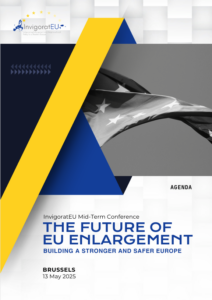Headquarters: Svetog Nauma 7, 11000
Office address: Đorđa Vajferta 13, 11000
Phone:: +381 11 4529 323

28. June 2022. – Today, in the premises of the EU Info Centre in Belgrade, a panel discussion “From France to the Czechia: It’s geopolitics…” was held. This is the thirteenth panel discussion organized by CEP in cooperation with the EU Delegation to Serbia on the occasion of the change of the presidency of the EU Council.
H. E. Emanuele Giaufret, Head of the EU Delegation to Serbia, H. E. Pierre Cochard, Ambassador of France to Serbia, H.E. Tomáš Kuchta, Ambassador of the Czech Republic to Serbia, and Milena Lazarević, co-founder and program director of CEP, spoke at the event. The panel was moderated by Srđan Majstorović, Chairman of Governing Board of CEP.
The central topic of the event was the current geopolitical circumstances in the world, how the EU reacted to them, how those circumstances changed its policies, with an emphasis on the enlargement policy, both to the countries of the Western Balkans and the countries of the Southeast Partnership.
“Back in 2018, we started thinking and working on a proposal on how to stop the enlargement policy from being such a bogeyman. In October 2021, we made a proposal so that countries do not have to wait too long to receive certain benefits of membership, but, in return, give some institutional limitations, which would satisfy skeptical EU member states,” Lazarević said. She also referred to the Intergovernmental Conference in Brussels, which was assessed negatively by both decision-makers and civil society organizations. “We must be aware of the positive elements of the Conference, although I understand that some decisions have been disappointing. For the first time since Thessaloniki, the membership perspective is clearly mentioned, and we have an invitation from the EU Council to the Commission to improve the enlargement process,” Lazarevic said. She also commented on the declining public support for EU integration, saying that “public opinion is very responsive to what is happening in the enlargement process” and that it is therefore necessary to change the way of accession to the EU so that citizens would continuously benefit more and more, such as increasing funding. “We need the enlargement process to be less burdened by unanimous voting – we need to use more qualified majority voting for enlargement,” Lazarevic said.
„24th February was the moment of accelerating history and a turning point in European politics,” Giaufret said. “Russian aggression has forced the EU to speed up work on strategic autonomy.” When it comes to Serbia, Giaufret pointed out that compliance with EU sanctions against Russia and gradual adjustment of Serbia’s foreign policy to EU policy is still a requirement. “We understand the situation in which Serbia finds itself. We want to end your gas dependence on Russia. We are open to opening further investments in this area, and we have proposed the creation of a joint platform for the purchase of gas and the inclusion of Serbia and other Western Balkan countries in that platform,” Giaufret said. “A lot of political capital is being spent in Brussels these days on how to speed up enlargement.”
H.E. Pierre Cochard said that France, the country that held the presidency at the time of the war in Ukraine, tried to mobilize the EU to respond quickly and uniquely to this challenge. “When we were preparing for the presidency, in the moments before the start of the war, our priority was already to build a Europe that would be sovereign in difficult times. During our presidency, we managed to organize assistance to Ukraine very quickly, six packages of sanctions against Russia were adopted, and in the end, by giving the status of a candidate, the EU showed even more solidarity towards Ukraine and Moldova,” he pointed out. “EU reform is necessary and possible despite the situation in Ukraine. It is important that we continue to develop our Strategic autonomy, with the development of new ideas, such as the European Political Community, “he said. “It is not a substitute for enlargement or the prospect of membership, but something that would first enable Moldova and Ukraine to have a forum where they will be with their European partners, because we know that the road to EU membership is a long one,” Cochard said.
“I am almost convinced that the opening of negotiations with Northern Macedonia and Albania will take place during our presidency, thanks to the previous efforts of our French colleagues. I also expect the opening of at least one cluster with Serbia, visa liberalization for Kosovo and candidate status for Bosnia and Herzegovina. This is the best possible scenario, but we will see “, said H.E. Tomáš Kuchta. He also announced the holding of the Summit in Prague, which will bring together EU member states and other non-member countries, not only from the Western Balkans, but also Norway, Iceland, Georgia, Ukraine and Moldova.
Kuchta pointed out that the EU wants to expand, that it is not forced to do so, but that this is the way it achieves its vision, and that it is slowly becoming proactive, not exclusively reactive – one of the proactive measures is strengthening defense capacities.